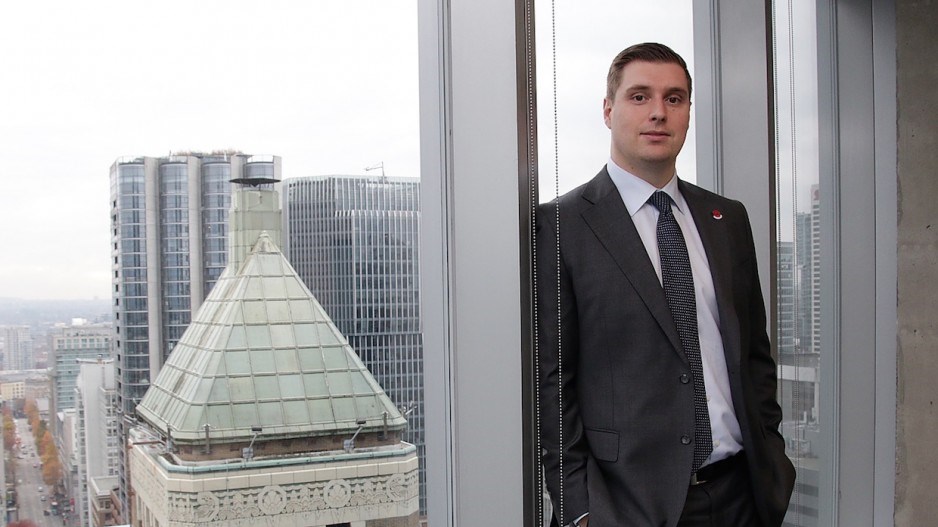One of Vancouver’s largest office real estate tenants, WeWork, is in turmoil after ousting its CEO, indefinitely postponing its initial public offering (IPO), laying off workers and watching its market valuation plummet.
The troubles could affect the 678,000 square feet of Metro Vancouver office space that CBRE counted the co-working-space company as either occupying or intending to occupy.
WeWork occupies space at:
•555 Burrard Street (Bentall 2);
•595 Burrard Street (Bentall 3);
•333 Seymour Street;
•2015 Main Street;
•6060 Silver Avenue in Burnaby, site of the Station Square building at Metropolis at Metrotown; and
•450 Southwest Marine Drive, site of the Marine Gateway building.
The largest of the sites that WeWork has announced plans to occupy comprises 170,000 square feet at BentallGreenOak’s future B6 tower, at 1090 West Pender Street, likely to be completed in the second quarter of 2023.
WeWork has also announced plans to occupy space at 1045 Howe Street and at 4622 Brentwood Boulevard, which is part of the Amazing Brentwood development. In 2017, it announced plans to take the upper floors of the Hudson’s Bay building at the corner of Granville and West Georgia streets – an occupation would be contingent on extensive renovations to the site that have yet to take place. It does not have a lease in place at that site, however, so that occupation may not take place.
The larger problem is that the unprofitable company needs investment capital to expand, and perhaps to survive.
It filed paperwork in August to hold an IPO based on a valuation that was in the US$47 billion range. That value then plummeted to less than US$10 billion a month later, and the New York Times noted that respected hedge fund manager Bill Ackman said the company’s value “has a pretty high probability of being a zero.”
Large investor SoftBank in October stepped in to buy former WeWork CEO Adam Neumann’s shares for close to US$1 billion, in part because Neumann’s shares came with disproportionately strong voting rights. Combined with a US$500 million loan to repay a credit line, and a US$185 million consulting fee, SoftBank’s compensation to get Neumann out of the picture is in the US$1.7 billion range.
SoftBank had already put billions of dollars into WeWork, and an open question is how much more money the Japanese conglomerate intends to pump into the money-losing venture. Some layoffs have taken place, and WeWork's executive chairman Marcelo Claure on November 18 confirmed in an email to staff that more layoffs are imminent. Pundits suggest the company may lay off about one third of its 12,000 or so global staffers.
“Our understanding is that Vancouver is one of the top-performing markets out of all the cities that they operate in within North America,” CBRE’s Vancouver managing director, Jason Kiselbach, told Business in Vancouver.
“If you look at it from that perspective, at least the current existing spaces are fairly safe,” he said. “Our understanding is that anything they have committed to already in Vancouver they will move ahead with.”
If WeWork does try to get out of lease commitments, the good news for the company is that Vancouver has a hot commercial real estate market. The process for the company would be to try to find a sublease tenant, and there is a chance that it would be able to sublease its space for more money than it has committed to pay on its headlease.
The process, Kiselbach said, would be to first find the tenant and then go to the landlord to get approval for the sublease. The landlord could theoretically reject the subtenant, or tell WeWork that it will tear up WeWork’s lease and sign the subtenant to a new headlease, Kiselbach said.
Colliers International’s senior managing director for Vancouver, Maury Dubuque, agreed.
He added that Vancouver’s office real estate market is so tight that losing a large tenant in an under-construction project would likely not cause any landlord much anxiety.
One of WeWork’s competitors may want to snap up the space.
Colliers represents WeWork competitor Spaces, and Dubuque said that Spaces is actively looking to add to its 560,000 square feet of space in the region. One of those Spaces' sites is 68,000 square feet at the former Tom Lee Music building at 929 Granville Street.
“I don’t see [co-working spaces] as a trend at all,” he said. “I see it as a foundation of any well-leased office building.”
Dubuque said that when Colliers needs to bring on people to complete projects and it needs extra office space for varying short periods of time, it is helpful if it can locate those workers in the same building, in a co-working space.
If it instead has to go to the landlord and ask to lease its own designated space, the landlord can demand that Colliers lease the space for a longer time period than needed, Dubuque said.
Co-working spaces are flexible and free of extra expenses such as tenant improvements, he added.
The ease of buying desk space in co-working spaces is particularly important when the office market is tight, as Vancouver’s is now.
Colliers statistics show that downtown Vancouver’s office vacancy rate at the end of September was 2.1%. High-quality triple-A space vacancy in the downtown is almost nothing – 0.3%, Dubuque said.
In the suburbs, the vacancy rate is around 3.1%.
To demonstrate how low that is, real estate conventional wisdom is that a balanced market would have a vacancy rate in the 8%-to-10% range. •




